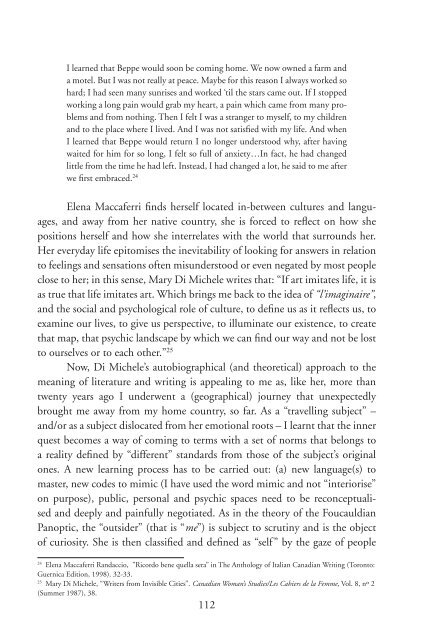Teaching Subjectivity. Travelling Selves for Feminist ... - MailChimp
Teaching Subjectivity. Travelling Selves for Feminist ... - MailChimp
Teaching Subjectivity. Travelling Selves for Feminist ... - MailChimp
You also want an ePaper? Increase the reach of your titles
YUMPU automatically turns print PDFs into web optimized ePapers that Google loves.
I learned that Beppe would soon be coming home. We now owned a farm and<br />
a motel. But I was not really at peace. Maybe <strong>for</strong> this reason I always worked so<br />
hard; I had seen many sunrises and worked ‘til the stars came out. If I stopped<br />
working a long pain would grab my heart, a pain which came from many problems<br />
and from nothing. Then I felt I was a stranger to myself, to my children<br />
and to the place where I lived. And I was not satisfied with my life. And when<br />
I learned that Beppe would return I no longer understood why, after having<br />
waited <strong>for</strong> him <strong>for</strong> so long, I felt so full of anxiety…In fact, he had changed<br />
little from the time he had left. Instead, I had changed a lot, he said to me after<br />
we first embraced. 24<br />
Elena Maccaferri finds herself located in-between cultures and languages,<br />
and away from her native country, she is <strong>for</strong>ced to reflect on how she<br />
positions herself and how she interrelates with the world that surrounds her.<br />
Her everyday life epitomises the inevitability of looking <strong>for</strong> answers in relation<br />
to feelings and sensations often misunderstood or even negated by most people<br />
close to her; in this sense, Mary Di Michele writes that: “If art imitates life, it is<br />
as true that life imitates art. Which brings me back to the idea of “l’imaginaire”,<br />
and the social and psychological role of culture, to define us as it reflects us, to<br />
examine our lives, to give us perspective, to illuminate our existence, to create<br />
that map, that psychic landscape by which we can find our way and not be lost<br />
to ourselves or to each other.” 25<br />
Now, Di Michele’s autobiographical (and theoretical) approach to the<br />
meaning of literature and writing is appealing to me as, like her, more than<br />
twenty years ago I underwent a (geographical) journey that unexpectedly<br />
brought me away from my home country, so far. As a “travelling subject” –<br />
and/or as a subject dislocated from her emotional roots – I learnt that the inner<br />
quest becomes a way of coming to terms with a set of norms that belongs to<br />
a reality defined by “different” standards from those of the subject’s original<br />
ones. A new learning process has to be carried out: (a) new language(s) to<br />
master, new codes to mimic (I have used the word mimic and not “interiorise”<br />
on purpose), public, personal and psychic spaces need to be reconceptualised<br />
and deeply and painfully negotiated. As in the theory of the Foucauldian<br />
Panoptic, the “outsider” (that is “me”) is subject to scrutiny and is the object<br />
of curiosity. She is then classified and defined as “self” by the gaze of people<br />
24<br />
Elena Maccaferri Randaccio, ”Ricordo bene quella sera” in The Anthology of Italian Canadian Writing (Toronto:<br />
Guernica Edition, 1998). 32-33.<br />
25<br />
Mary Di Michele, “Writers from Invisible Cities”. Canadian Woman’s Studies/Les Cahiers de la Femme, Vol. 8, nº 2<br />
(Summer 1987), 38.<br />
112

















